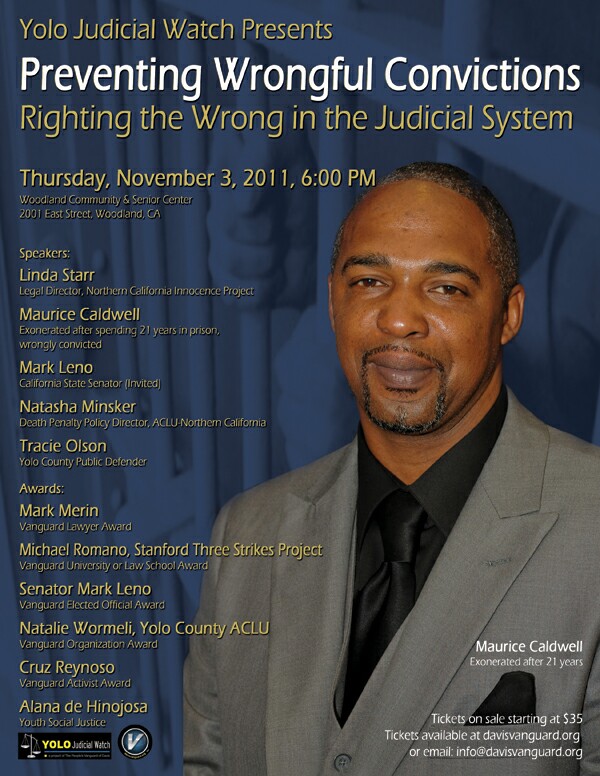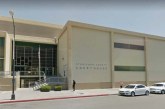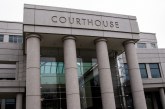On November 3, Yolo Judicial Watch will focus its attention, at its annual Fundraiser and Awards Ceremony Event, squarely on the issue of Preventing Wrongful Convictions. This event will feature, among others, Linda Starr, the Legal Director of the Northern California Innocence Project, and Maurice Caldwell, a man who was wrongfully convicted of a 1990 murder and who had his verdict overturned last December after spending over 20 years in prison. He was finally released this year around the first of April.
Another problem that plagues the judicial system, however, is the issue of prosecutorial misconduct.
In March, the Veritas Initiative, the research and policy arm of the Northern California Innocence Project (NCIP) at Santa Clara University School of Law, released Preventable Error: Prosecutorial Misconduct in California 2010, which follows up on last October’s Presentation.
On October 5, 2010, the Northern California Innocence Project came out with a report, “Preventable Error: A Report on Prosecutorial Misconduct in California 1997-2009,” that uncovered over 700 cases in which courts had found prosecutorial misconduct during an 11-year period.
The Vanguard would eventually find at least six that occurred in Yolo County.
Of all of those cases, the researchers reported that initially only six prosecutors were disciplined. This is a particularly concerning statistic, because the ability of the typical defendant to gain any sort of recourse is very limited since, under most conditions, prosecutors have immunity from lawsuits and redressing prosecutorial misconduct.
Last week, Maurice Possley and Cookie Ridolfi, who headed up the initial report, had an Op-ed in the San Jose Mercury News in which they reported, “Two decades ago, in response to a highly critical series of media reports that revealed how the State Bar of California had virtually abdicated its role in the investigation and discipline of attorneys, the Legislature passed two laws requiring courts and lawyers to report misconduct to the Bar.”
“But research shows these mandates are largely ignored by the courts and attorneys and are unenforced by the Bar, even though lack of compliance is in itself grounds for discipline.”
They cited two recent decisions as bolstering the need for the State Bar to take more seriously the problem of prosecutorial misconduct.
They wrote: “The Sixth District Appellate Court found substantial evidence that Santa Clara County Deputy District Attorney Troy Benson, in an attempt to prevent a defendant from obtaining a dismissal of his prosecution in a child sexual assault case and deflect a Bar investigation of Benson’s own conduct, solicited ‘untruthful declarations from his adversary and the trial judge … made misleading statements to the trial judge and his adversary concerning critical evidence in the case … and provided false testimony in the hearing on defendant’s motions.’ “
While the trial judge would dismiss the case entirely based on the prosecutor’s misconduct, the Appellate Court reversed the dismissal of the case but left intact the findings of misconduct.
The Appellate Court made its position clear, stating, “Our conclusion should in no way be construed as a signal that we condone the misconduct that the trial court found, based upon substantial evidence, to have occurred here.”
They cited a second case, as well, where an LA County judge did set aside convictions of an individual who served 17 years in prison, for a crime that later they determined he did not commit.
This case, which gained much notoriety in the last month, shows the nexus between prosecutorial misconduct and wrongful convictions.
Playing a critical role in that case was the Northern California Innocence Project including lawyers Paige Kaneb, Linda Starr and Seth Flagsberg, Loyola Law School’s Project for the Innocent lawyers Adam Grant and Laurie Levenson, and Federal Public Defender Investigator Deborah Crawford. Law students from Santa Clara University School of Law and Loyola Law School also helped to investigate Obie Anthony’s innocence since 2008, interviewing witnesses and conducting research.
Judge Kevin Filer ordered the 37-year-old Obie Anthony released after 17 years, when he became convinced “that the prosecution’s key witness, a pimp, lied to the jury. The witness has since admitted he never clearly saw the gunman at the scene of the crime.”
Judge Filer would “harshly criticize” the prosecutors for their failure to disclose to the jury that they had cut a deal with the witness, “agreeing to seek a light sentence on pimping and pandering charges in exchange for his testimony against Anthony and a co-defendant, Reggie Cole.”
Linda Starr, who will be the featured speaker at next month’s event said: “This conviction should have never happened.”
Ms. Starr added: “Police purposely ignored and hid evidence that did not support their theory, and manipulated the witnesses to create evidence to support their misguided tunnel vision. The prosecution falsely denied that they granted their star witness a deal for his cooperation and failed to correct his lies at trial. And Mr. Anthony’s own attorney failed to investigate the case. For their failures, Mr. Anthony has spent 17 years in prison for a murder that he did not commit – and the actual murderer has remained free. This cannot be considered justice.”
Mr. Cole had won release a few months ago, after a different judge overturned his murder conviction on similar grounds.
He reportedly said after the ruling, “I’m overwhelmed, man, it’s been a long time coming.”
According to Mr. Possley and Ms. Ridolfi, the judge also found “Los Angeles County Deputy District Attorney George Costello failed to correct the perjured testimony of the key prosecution witness — testimony that he knew was untrue yet allowed to stand to get the conviction. Filer also ruled that Costello had failed to disclose evidence that suggested Anthony was innocent and that Anthony’s defense attorney had failed to fully investigate the case.”
Because of prosecutorial immunity, neither man can sue the LA District Attorney’s office.
According to Mr. Possley and Ms. Ridolfi, their study has “documented 150 reversed convictions or sentences due to prosecutorial misconduct — all of which should have been reported to the Bar by both the attorneys and the courts involved.”
“The Bar has reported that in 90 of the cases, no reports were filed by either courts or attorneys. That means that in 60 percent of the cases, both the courts and the attorneys failed to heed state law. During that same time period, the Bar publicly disciplined just seven prosecutors,” they wrote.
Changes may be on the way, in part due to the negative publicity of the original Prosecutorial Misconduct report.
“Recently, after the Bar hired Los Angeles Assistant U.S. Attorney Jayne Kim to oversee the disciplinary process, she said her goals were ‘getting the State Bar’s backlog down to zero and assuring that there is a zero tolerance for attorney misconduct in California.’ “
“As part of her initiative, Kim should enforce the state reporting rules and take seriously judicial findings of misconduct by prosecutors — particularly misconduct that deprives the innocent of their liberty,” they concluded.
The Yolo Judicial Watch event will be held on the evening of November 3 at the Woodland Community and Senior Center. Tickets are available starting at $35. For additional information about sponsorship opportunities please click here.
—David M. Greenwald reporting






David, this looks like a fascinating program that will be a valuable continuing ed. opportunity for the law enforcement and legal communities–as well as a chance for media people, elected representatives and others in how we administer justice in California.
So, I hope we’ll see that participation goes well beyond the [u]Vanguard[/u] “typical” readership and support base. Good job bringing together an interesting event.
JustSaying: I dont know about Woodland, but the weekly readership in Davis is huge, and across all socioeconomic and political spectrums.
Now DMG, would you please supply, for the same 10 year period, the number of cases of misconduct for:
1) Teachers;
2) Doctors;
3) Legislators;
4) Bus drivers; and,
5) Celebrties?
Thank you in advance…
I don’t know the answer to any of those and what’s more I’m not that interested in that answer.
What I do think is:
1. When a doctor commits misconduct it can have serious consequences, you can sue him and have recourse. He does not have immunity.
2. The number cited in these studies understates the problem quite substantially because it only reflects a small subset of cases where allegations have been proven. That doesn’t count those cases where there was a settlement and the withholding of evidence or other misconduct is not known, it doesn’t count those cases where we believe there wss PM, and it does not count those cases where we don’t know what we don’t know.
3. Defending one form of misconduct by pointing out another form of misconduct is a non-starter, two wrongs don’t make a right.
David: I am thrilled to see that you are sponsoring such an event. I am very excited about the speakers from the Innocence Project.
I agree with “Just Saying” that I hope that many law enforcement and elected officials will attend this educational opportunity along with other citizens of our community.
Any information that can help prevent wrongful convictions is very worthwhile.
DMG opined: [quote]I don’t know the answer to any of those and what’s more I’m not that interested in that answer. [/quote]
I know — why should people critically analize by comparing and constrasting the human condition when a narrow gotcha viewpoint will do?
AdRemmer
.
I am able to address this issue directly with regard to doctors. In addition to the ability of patient’s to sue for medical malpractice as noted by David, there is a complex system of safeguards in place to deal with misconduct on the part of physicians be it medical, ethical or both. First dealing with medical misconduct, if there is a mistake made, and it is determined to be due to individual doctor error by peer review or hospital committee, the doctor may be mandated to obtain additional training in this area. For repetitive errors or failure to complete mandated training, the doctor may lose hospital privileges for this and similar procedures.
For more serious or repetitive transgressions, the doctor may be brought before their individual medical board ( for example the American Board of Obstetrics and Gynecology) where their board membership may be revoked effectively making it impossible for them to obtain hospital privileges or work in a group practice.
Finally, the doctors name can be submitted for review to the state medical board which has the ability to rescind their license. Parallel but separate processes are in place for ethical lapses, and a third track exists which emphasizes rehabilitation and re entry for those whose impairment is due to alcohol or drug addiction.
I am unaware whether or not there are similar safeguards in place for prosecutors and or defense attorneys.
I would be interested to know whether or not this is the case. Do you know ?
One final point. I find it ironic that we allow patients to sue for medical malpractice which is usually honest error, not deliberate withholding of information or disinformation, but do not allow defendants to sue for even proven deliberate prosecutorial misconduct since both medical and legal malpractice can have life or death consequences.